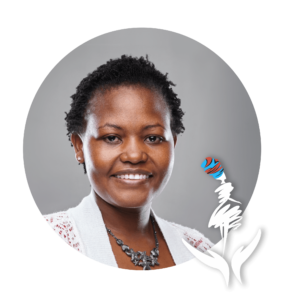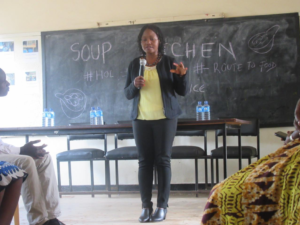 Dr. Elizabeth Kimani-Murage is a Senior Research Scientist at the African Population and Health Research Center (APHRC), and a Wellcome Trust International Engagement Fellow. More recently, she joined Vitamin Angels as a member of their board of directors. She is an adjunct Assistant Professor at Brown University, USA and an honorary lecturer at the University of Glasgow, UK. She is a Public Health Specialist/Public Health Nutritionist, leading the Maternal and Child Wellbeing Unit at APHRC. She holds a PhD in Public Health (2010), specializing in Nutrition; a Masters of Public Health (2004) specializing in epidemiology and disease control; and a Bachelor of Science degree in Environmental Health (1999). She has a cumulative work experience of 15+ years (~ 10 years post-doctoral).
Dr. Elizabeth Kimani-Murage is a Senior Research Scientist at the African Population and Health Research Center (APHRC), and a Wellcome Trust International Engagement Fellow. More recently, she joined Vitamin Angels as a member of their board of directors. She is an adjunct Assistant Professor at Brown University, USA and an honorary lecturer at the University of Glasgow, UK. She is a Public Health Specialist/Public Health Nutritionist, leading the Maternal and Child Wellbeing Unit at APHRC. She holds a PhD in Public Health (2010), specializing in Nutrition; a Masters of Public Health (2004) specializing in epidemiology and disease control; and a Bachelor of Science degree in Environmental Health (1999). She has a cumulative work experience of 15+ years (~ 10 years post-doctoral).
Elizabeth is passionate about improving lives and promoting human dignity through action-oriented research and engagement. She is leading research in public health issues, especially maternal and child health and nutrition among vulnerable populations in sub-Saharan Africa (SSA), using both quantitative and qualitative methods, and involving local and international partners.
Her research mainly involves testing feasibility and effectiveness of strategies to improve maternal and child wellbeing. She has over 50 peer-reviewed scientific publications on public health issues. She has contributed to several local and international technical/professional groups, including the Global Nutrition Report Series 2014-2017 as a member of the International Expert Group.
She works closely with the Kenya Ministry of Health, particularly the Unit of Nutrition and Dietetics and Unit of Child Health. She has also been actively involved in the development of the national guidelines related to nutrition and child health. Over time in her career path she has had extensive experience in data collection and management, data analysis, reporting, scientific writing, communication and engagement of different audiences and policy engagement.
What made you pursue a career in research and especially with a focus on maternal and child wellbeing?
I never considered a career in research as I grew up – I wanted to do things that directly touched people’s lives like law or medicine (see more explanation, under regrets). I however was exposed to research while I was undertaking my undergraduate degree. I helped my professors with data collection and management for their research projects as a student.
I conducted my first research as a lead researcher when I was an undergraduate student (fourth year). I was interested in changing the world for the urban poor – and the focus for my research was on the quality of Water that residents in urban poor settings in a slum in Eldoret, Kenya used. This was informed by my experience with an urban poor family who became my friends when I was a student – visited them often, and was concerned about their level of vulnerability – particularly the quality of water they used – being in a densely populated setting, with onsite pit latrines and shallow wells within no distance apart – I wanted to tell their story to inform change for them. I wanted to inform interventions to improve their water situation. I was so determined that while my fellow students were almost completing their knowledge attitudes and practice (KAP) studies, I was still looking for a donor for my dream project as it was going to be an expensive endeavour – collecting water samples from shallow wells in the slum, testing the water samples for faecal contamination in the lab, measuring distance between shallow wells and pit latrines to relate level of contamination with the distance, and collecting KAP data – Wow! That was so much – Bless my supervisor/mentor – who worked with me through the journey – being a microbiologist he spent hours on end with me in the lab! – Thankfully, I got to find a donor – an implementing organization that got very interested in my study because at the time they were also looking for funding to provide tapped water for the slum community – so my report would inform their proposal. I published this study several years later.
I conducted a ground breaking research on use of insecticide treated clothes to prevent malaria among refugees in a camp in Kenya.
 My second led study was when I was doing my Master of Public Health. I conducted a ground breaking research on use of insecticide treated clothes to prevent malaria among refugees in a camp in Kenya. This study put me in the limelight – being interviewed by local and international media.
My second led study was when I was doing my Master of Public Health. I conducted a ground breaking research on use of insecticide treated clothes to prevent malaria among refugees in a camp in Kenya. This study put me in the limelight – being interviewed by local and international media.
I then found myself at APHRC in 2003 – in a bit of a strange way. I attended a conference in Tanzania – to present the paper on malaria. I got to know of this network for malaria… and put a note there — saying “I am so and so… I have done so and so … and I am looking for a job…” Someone then at APHRC saw this “advert” and told me of an opportunity at APHRC – for pre-doctoral research traineeship. During the interview they were impressed by my research. Voila! There I had a job! I had “tarmacked” for some time —more looking for a job in intervention organizations – and so it did not matter whether research or intervention job – I needed a job!
So, I started being involved in research among the urban poor – the signature focus for APHRC then. I was particularly interested in conducting research among mothers and children, based on their vulnerability to poor health particularly malnutrition. I have particularly been interested in research that would optimize breastfeeding and nutrition for children in urban poor settings and other vulnerable populations.
More recently, I have embraced public engagement as a catalyst to translating research evidence into action! I am engaging on the right to food for the urban poor in Kenya – being that my research in these settings indicate high levels of food insecurity (~80% being food insecure), high levels of malnutrition (~ 50% of children under five being stunted) and poor breastfeeding practices due to need to look for livelihood in the absence of maternity protection (less than 2% of children are exclusively breastfed for six months as recommended by the WHO).
How would you describe your career path?
My career path has been terrific! Thanks to several professional fellowships, great mentorship and great opportunities that came my way! I joined APHRC in 2003 as a research trainee – just after I had completed a master’s degree in public health. I then went to South Africa for a PhD in 2007 and returned to APHRC in 2010 as a postdoctoral research fellow. I have risen through the ranks to now becoming a Senior Research Scientist in only 10 years postdoc, and I am heading the maternal and child wellbeing unit. My research has been impactful, informing policies in Kenya – e.g. the baby friendly community initiative (BFCI). I am leading noteworthy initiatives e.g. leading research on the feasibility of the first ever human milk bank in Kenya.
What does a typical day working at the research centre look like for you?
My day is usually more than 24 hours!
I wear several hats – so my typical day may not be a typical day for any researcher. I am a researcher – leading several research projects, publishing and raising funds for new projects; I am also a Head of Unit; with a lot of administrative work, supervision and mentoring to do; I am also a public engagement fellow with the Wellcome Trust, engaging communities and change agents including policy makers for change! I distribute my time across all these activities. My day is full to the brim! Despite all this, I have a family and I also know I have to take care of my health – so I start the day early in the morning with a dose of exercise at the gym – this keeps my weight and health in check but also, I believe, gives me a dose of excitement (to smile at the many people I have to interact with) and energy for the long day!
Read more about Dr Elizabeth Kimani-Murage and the great work she is doing to improve health outcomes in Part II of her interview.
To be continued…

Leave a Reply